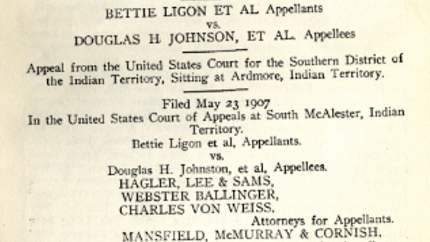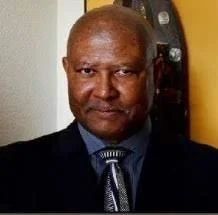Indian Territory: A Legacy We Carry Forward
In 1907, Bettie Ligon (pictured) and hundreds of other families — stood up and filed what became known as Equity Case 7071.
Within Indian Territory, race was used to exclude African-Native lineal descendants by the Five Civilized Tribes (Cherokee, Choctaw, Chickasaw, Muscogee Creek, and Seminole Nations.
These families were placed on the Freedmen Roll not because they lacked Native ancestry, but because of a system that tied their identity to enslavement instead of lineage.
Many of our families were direct descendants of Chickasaw or Choctaw citizens by blood. Yet when the rolls were created, they were marked only as “Freedmen,” denying them land, rights, and the full citizenship their heritage should have guaranteed.
Refusing To Be Erased
This case was more than a lawsuit; it was a declaration that our families refused to be erased. Over 1,600 people joined the fight, demanding to be moved from the Freedmen roll to the Citizen-by-Blood roll. They were not asking for favors — just acknowledgment of who they truly were.
The stakes were enormous. If recognized, each family member would have received a 320-acre allotment, equal to other enrolled citizens. The collective value of that land reached millions of dollars, but even more valuable was the recognition that our ancestors belonged — that their bloodline mattered.
Equity Case 7071: A Fight for Recognition
Within Indian Territory, the plight of Freedman descendants & Equity Case 7071 is not as a closed chapter but a foundational call-to-action.
Our ancestors fought with dignity, courage, and relentless hope. Their efforts remind us that identity cannot be erased by paperwork, and justice delayed is still justice worth pursuing.
Their story is our inheritance — and our responsibility.
Terry Ligon (pictured) is an author and direct descendant of Bettie Ligon who carries forward the research and fight for equality within Indian Territory.
He created the blog, “Bettie’s List” to manually identify those impacted by the Equity Case 7071 found here.
Why This Matters Today
For many of us, this history is not distant — it lives in our identity, our family records, and our unresolved questions. We are descendants of people who fought courageously for their rightful place in the Chickasaw and Choctaw Nations. Their struggle still shapes our lives.
This case remains relevant because:
It documents a historic injustice- Our ancestors were denied recognition not because of a lack of evidence, but because their African ancestry overshadowed their Native ancestry in the eyes of government authorities.
It affects families still searching for acceptance- Many Freedmen descendants today continue that same fight — seeking acknowledgment, belonging, and restoration of rights.
It helps correct the narrative- Equity Case 7071 proves that Freedmen history is not marginal or separate. We are woven into the story of the tribes — as relatives, citizens, and contributors.
It strengthens the call for restoration and truth- Understanding this case gives today’s decision-makers the context needed to address the unfinished business our ancestors started more than a century ago.


